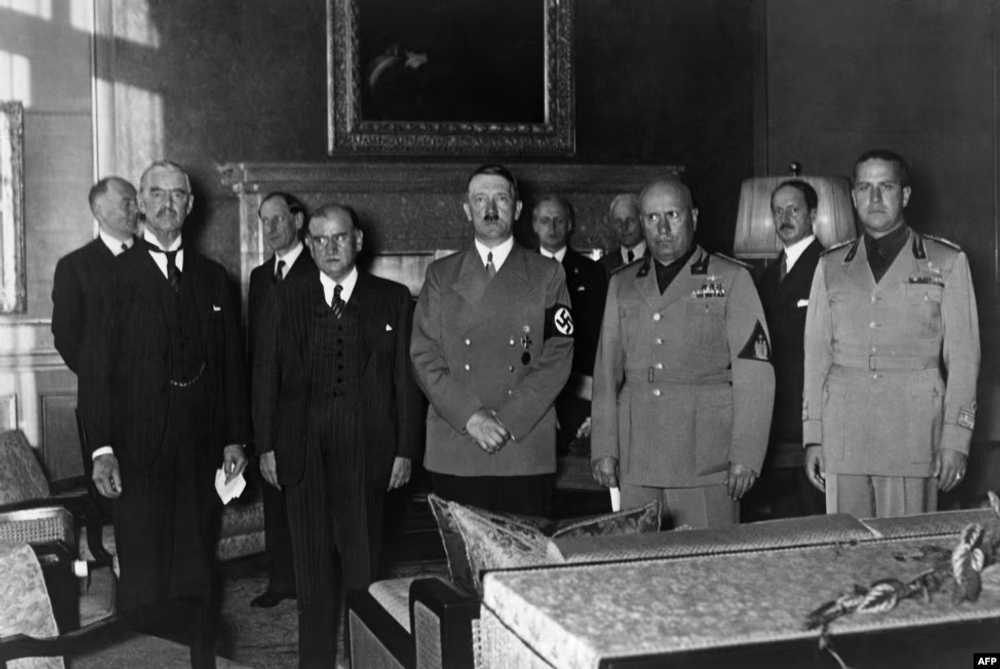Published
- 4 min read
Revisiting Munich: Why 2025 Peace Talks May Not Mirror 1938

The Case for Caution: Why 1938 and 2025 Are Different Realities
The comparison between the Munich Agreement of 1938 and a potential 2025 peace deal between Donald Trump and Vladimir Putin has gained traction in policy circles. While both scenarios involve high-stakes negotiations and the potential sacrifice of territorial integrity for peace, there are key differences that render this analogy flawed. Rather than focusing solely on the pitfalls of appeasement, it’s essential to consider the evolving geopolitical dynamics that distinguish 2025 from the fraught atmosphere of 1938.
The Shifting Power Landscape of Europe
Unlike the pre-World War II era, Europe today is not a collection of fragmented states with limited collective defense mechanisms. NATO, though challenged by internal disputes, remains a formidable alliance capable of countering Russian aggression. The Munich Agreement failed partly because there was no unified European defense framework; today, NATO provides a deterrent that did not exist in 1938.
Poland, Finland, and the Baltic states, among others, have demonstrated a commitment to bolstering their military capabilities. While some criticize European nations for underinvesting in defense, these countries have significantly outpaced the military preparations seen in the 1930s. Suggesting that a Trump-led 2025 peace deal would replicate Chamberlain’s concessions ignores these structural differences.
Ukraine Is Not Czechoslovakia
The Munich Agreement sidelined Czechoslovakia, leaving its leadership excluded from decisions about their own nation. In contrast, any 2025 peace deal will almost certainly involve Ukrainian President Volodymyr Zelensky or his successor at the negotiating table. Ukraine’s sovereignty is far more entrenched in the global consciousness, bolstered by extensive international support and financial aid.
Ukraine’s ability to resist Russian aggression since 2022—despite significant losses—has demonstrated resilience and resolve. Unlike Czechoslovakia in 1938, Ukraine has a robust international coalition actively supporting its sovereignty. A negotiated settlement in 2025 would not necessarily signal abandonment but could represent a strategic pause for Ukraine to rebuild and rearm.
Lessons Learned: Avoiding the Traps of Appeasement
Critics often frame peace negotiations as inherently flawed, citing historical failures like Munich. However, the lesson from 1938 is not that negotiation itself is misguided but that diplomacy without preparation or enforcement mechanisms is doomed to fail. In 1938, Britain and France were unprepared to back their commitments militarily, emboldening Hitler.
Today, any agreement with Russia must be accompanied by clear, enforceable terms. This could include robust international monitoring, the stationing of NATO forces in nearby regions, and economic deterrents to prevent future aggression. By emphasizing accountability, the West can avoid repeating the failures of Munich.
The Role of U.S. Leadership
Donald Trump’s potential role in 2025 peace negotiations has drawn comparisons to Neville Chamberlain’s perceived naivety. However, dismissing Trump outright overlooks the complex motivations of all parties involved. While Trump’s “America First” rhetoric raises concerns about his willingness to stand firm against Russian aggression, his administration would operate within a vastly different geopolitical framework than Chamberlain’s Britain.
Moreover, Trump’s foreign policy record is more nuanced than often portrayed. While the Doha Agreement with the Taliban has been criticized, it also marked a significant shift toward ending America’s longest war. Any 2025 agreement with Russia will require careful scrutiny but should not be dismissed as inherently destined for failure.
Russia’s Constraints: A Weakened Aggressor
Russia in 2025 will likely be in a weakened state compared to Germany in 1938. After years of war in Ukraine, sanctions, and economic isolation, Russia faces significant internal challenges. While Vladimir Putin’s ambitions remain dangerous, his capacity for further aggression may be constrained. This is a stark departure from the unchecked power that Hitler wielded in 1938.
The inclusion of international actors, such as China, in negotiations could further shape the outcome. Beijing’s interest in stabilizing the region could pressure Moscow to accept terms that limit its expansionist aims. Such dynamics were absent in the lead-up to World War II, where alliances were far less interconnected.
Preparing for the Worst, Hoping for the Best
While the risks of appeasement remain valid, the parallels between 1938 and 2025 are not as straightforward as they seem. Instead of fixating on historical analogies, policymakers must focus on crafting a peace framework that balances deterrence with diplomacy. The failures of Munich provide valuable lessons, but they do not predetermine the outcome of future negotiations.
By addressing the unique challenges of the Russia-Ukraine conflict and leveraging modern tools of diplomacy, the West can aim for a peace agreement that avoids the pitfalls of the past. The success of such efforts will depend on unity, preparedness, and an unwavering commitment to Ukraine’s sovereignty.
